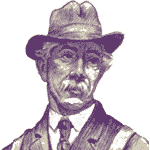|
|
Caryn James, "Critic's Notebook," New York Times, 8 June 2005 "Drawing on a prodigious amount of research into two centuries of diaries, self-help books, credit reports and legal cases, Sandage, a historian at Carnegie Mellon, paints a portrait gallery of American 'broken men, down-and-outers, no-accounts, third-raters, small fries, small potatoes, ... ne'er-do-wells [and] nobodies.'" London Review of Books, 19 May 2005 "Scott Sandage has written a splendid book.... Sandage has done a marvellous job exploring the dark side of this peculiar American gospel: the blithe judgment that failure reflects a personal defect, that want is a species of sin, and the insistence that the sources of wealth and poverty lie entirely 'in the man'." The Economist (UK) Harvard Book Review, vol. 6, no. 1 (Winter 2004) PopMatters May 3, 2005 St. Louis Post-Dispatch, April 24, 2005 The Daily Telegraph [London, UK], April 1, 2005 "Sandage, in Born Losers, quotes David Riesman, the sociologist, to the effect that by the middle of the 20th century, Americans had become unable to face "the possibility of defeat in one's personal life or one's work without being morally destroyed." The idea of the self-made man should have been liberating.... But this hopeful belief, while defining the future as gloriously open-ended, laid a heavy burden on those who did not succeed." San Francisco Chronicle, 6 March 2005 Seattle Times, 27 February 2005 Dallas Morning News, 12 March 2005 Jonathan Yardley, Washington Post Book World: "By examining the lives and careers of a number of businessmen who failed during the 19th century, [Scott Sandage] portrays what we reflexively think of as the dark side of the American dream but what is, in reality, an only slightly exaggerated mirror of the reality with which ordinary people -- i.e., thee and me -- are fated to contend. He explores what he rather nicely calls "the hidden history of pessimism in a culture of optimism" by recording the "voices and experiences of men who failed (and of their wives and families)" as expressed in their "private letters, diaries, business records, bankruptcy cases, suicide notes, political mail, credit agency reports, charity requests and memoirs." In so doing he examines the ways in which our attitudes toward failure and our ways of measuring it have changed; if at moments Sandage lapses into the clotted patois of contemporary academia (he teaches history at Carnegie Mellon University in Pittsburgh), for the most part Born Losers is readable, interesting and thoroughly researched." "Born Losers," admirably concise and formidably researched, is the history of America's reverse Horatio Algers. Scott A. Sandage, an associate professor of history at Carnegie Mellon University, logged a decade in the library to produce what amounts to an authoritative chronicle of the risks of lending and borrowing in 19th-century America (although the book ranges well into the 20th.) The Atlantic Monthly (an “Editor's Choice” book): Boston Globe, February 6, 2005 "Scott A. Sandage's new book, Born Losers: A History of Failure in America (Harvard, $35), is a story of debtors, bankruptcy laws, credit agencies, and broken men. It details how 19th-century attitudes toward financial ruin continue to inform our ideas about loserdom today. So pay attention and you might learn something." William S. McFeely, author of Grant: a Biography: "Born Losers is a beautiful piece of writing. Scott Sandage is history's Dickens; his bleak house, the late nineteenth century world of almost anonymous American men who failed. With wit and sympathy, Sandage illuminates the grey world of credit evaluation, a little studied smothering arm of capitalism. This is history as it should be, a work of art exploring the social cost of our past." Michael Kazin, author of The Populist Persuasion: An American History: "Here is a feast of historical insight, personal narrative, and literary panache. With his focus on the making of economic failure, Sandage enables us to see and understand 19th century America in an entirely new, provocatively sober way... A fascinating book." Louis P. Masur, author of 1831: Year of Eclipse: Americans do not like to talk about failure. It is the underside of an American dream that stresses winning over losing, succeeding over succumbing. But not everyone makes it and the story of failure has a history that Scott Sandage probes with subtlety and grace in this impressive work of cultural history. Born Losers is deeply researched, carefully argued, and well written. His examination of commercial failure and the problems of identity goes a long way toward reconfiguring our understanding of the American dream.
|
|
|
|

